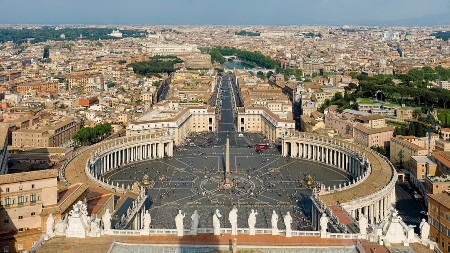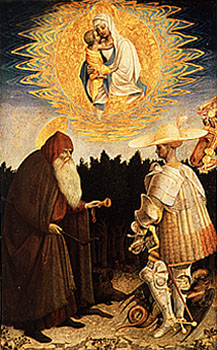Who was Saint Patrick?
FREE Catholic Classes
Saint Patrick - remembered with parades, the wearing of green and feasts throughout the world wherever there are people of Irish descent, or wish to be -- was the patron saint and national apostle of Ireland who is credited with bringing Christianity to the country.
Highlights
Catholic Online (https://www.catholic.org)
3/16/2015 (9 years ago)
Published in Living Faith
Keywords: St. Patrick, St. Patrick's Day, History, Catholic, Religious, Saint, Sainthood, Holiday
LOS ANGELES, CA (Catholic Online) - Saint Patrick described himself as a "most humble-minded man, pouring forth a continuous paean of thanks to his Maker for having chosen him as the instrument whereby multitudes who had worshiped idols and unclean things had become the people of God."
As to the question of "Why is the Shamrock the National Flower of Ireland?" It is because St. Patrick used it to explain the Holy Trinity to the pagans. Saint Patrick is believed to have been born in the late fourth century.
Keep the Saint in St. Patrick's Day! Shop these remarkable Catholic products.
Saint Patrick is forever known for driving the snakes from Ireland. It is true that there are no snakes in Ireland, but there probably never have been - the island was separated from the rest of the continent at the end of the Ice Age. As in many old pagan religions, serpent symbols were common and often worshiped. Driving the snakes from Ireland is more than likely an analogy of putting an end to such a pagan practice.
Saint Patrick not the first to bring Christianity to Ireland, but it is Patrick who is said to have encountered the Druids at Tara and brought an end to their pagan rites by winning them to the true faith. The story holds that he was used to bring conversion to the warrior chiefs and princes, baptizing them and thousands of their subjects in the "Holy Wells" that still bear this name.
There are conflicting reports of his death. One says that Patrick died at Saul, Downpatrick, Ireland, on March 17, 460 A.D. His jawbone was preserved in a silver shrine and was often requested in times of childbirth, epileptic fits and as a preservative against the "evil eye."
Another account says that St. Patrick ended his days at Glastonbury, England and was buried there. The Chapel of St. Patrick still exists as part of Glastonbury Abbey. Countless Catholic places of worship all around the world are named after St. Patrick, including cathedrals in New York and Dublin city.
While Saint Patrick's Day has come to be associated with everything Irish, anything green and gold, shamrocks and luck, it is most important to those who celebrate its intended meaning. St. Patrick's Day is a traditional day for spiritual renewal and offering prayers for missionaries worldwide.
---
'Help Give every Student and Teacher FREE resources for a world-class Moral Catholic Education'
Copyright 2021 - Distributed by Catholic Online
Join the Movement
When you sign up below, you don't just join an email list - you're joining an entire movement for Free world class Catholic education.

-

-
Mysteries of the Rosary
-
St. Faustina Kowalska
-
Litany of the Blessed Virgin Mary
-
Saint of the Day for Wednesday, Oct 4th, 2023
-
Popular Saints
-
St. Francis of Assisi
-
Bible
-
Female / Women Saints
-
7 Morning Prayers you need to get your day started with God
-
Litany of the Blessed Virgin Mary
Daily Catholic
 Daily Readings for Friday, January 17, 2025
Daily Readings for Friday, January 17, 2025 St. Anthony the Abbot: Saint of the Day for Friday, January 17, 2025
St. Anthony the Abbot: Saint of the Day for Friday, January 17, 2025 Prayer for a Blessing on the New Year: Prayer of the Day for Tuesday, December 31, 2024
Prayer for a Blessing on the New Year: Prayer of the Day for Tuesday, December 31, 2024- Daily Readings for Thursday, January 16, 2025
- St. Fursey: Saint of the Day for Thursday, January 16, 2025
- St. Theresa of the Child Jesus: Prayer of the Day for Monday, December 30, 2024
![]()
Copyright 2024 Catholic Online. All materials contained on this site, whether written, audible or visual are the exclusive property of Catholic Online and are protected under U.S. and International copyright laws, © Copyright 2024 Catholic Online. Any unauthorized use, without prior written consent of Catholic Online is strictly forbidden and prohibited.
Catholic Online is a Project of Your Catholic Voice Foundation, a Not-for-Profit Corporation. Your Catholic Voice Foundation has been granted a recognition of tax exemption under Section 501(c)(3) of the Internal Revenue Code. Federal Tax Identification Number: 81-0596847. Your gift is tax-deductible as allowed by law.





 Daily Readings for Friday, January 17, 2025
Daily Readings for Friday, January 17, 2025 St. Anthony the Abbot: Saint of the Day for Friday, January 17, 2025
St. Anthony the Abbot: Saint of the Day for Friday, January 17, 2025 Prayer for a Blessing on the New Year: Prayer of the Day for Tuesday, December 31, 2024
Prayer for a Blessing on the New Year: Prayer of the Day for Tuesday, December 31, 2024

